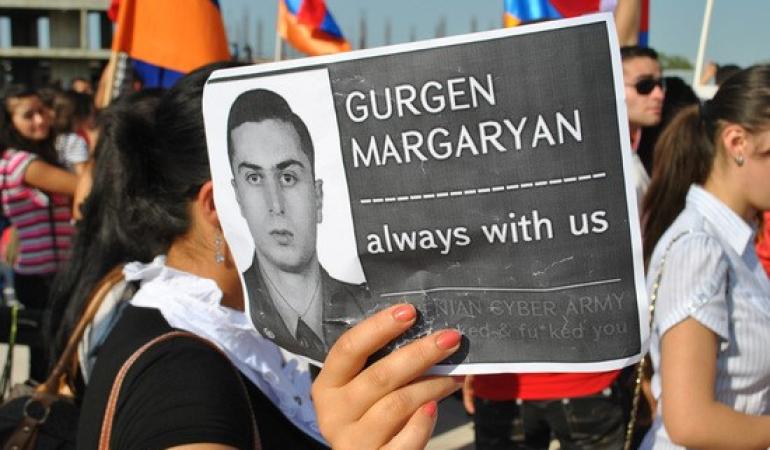
"It is not the individual Safarov, but the state Azerbaijan that should be called to account for the murder." Siranush Sahakyan
Azerbaijan has appealed the May 26 judgment of the European Court of Human Rights (ECHR) in the case of the Armenian officer Gurgen Margaryan, who was axed by Ramil Safarov in Budapest.
16 years after the murder, on May 26 of this year, the ECHR recorded that Baku violated the European Convention by releasing Ramil Safarov.
Lawyer Siranush Sahakyan, representing the interests of Gurgen Margaryan's successors at the ECHR, believes that the verdict was a big blow to Azerbaijan. "It is the first judicial act that officially confirms Azerbaijan's anti-Armenian policy, which has high patronage from the state," the lawyer stated during the interview with Azatutyun.
At the same time, the Armenian side also appealed the verdict to the Grand Chamber. Although, in general, according to the lawyer, the verdict was a victory for Armenia, there are some nuances. In 2004, the European Court did not attribute the murder of Gurgen Margaryan, who was hit with an axe at night during the NATO training, and the assassination attempt on the officer Hayk Makuchyan, who was participating in the same training, to Azerbaijan. They relied on the conclusion of the Hungarian judgement that Safarov acted as a private person when committing these acts. The European Court also released Hungary, which extradited Safarov, from responsibility. Meanwhile, the Armenian side is confident that sufficient grounds have been presented to recognize the state of Azerbaijan as responsible for the murder.
"Therefore, not the individual Safarov, but the state Azerbaijan should be held responsible for the murder itself. In this regard, the majority of the European Court did not share our approach to appeal the verdict in this regard and achieve final justice," Siranush Sahakyan noted.
Although the Hungarian court sentenced the murderer to life imprisonment, Hungary later extradited him to Baku, where Safarov was not only released, but also awarded high honours by President Ilham Aliyev. After his extradition to Azerbaijan, Ramil Safarov was welcomed as a hero. This circumstance is emphasised again by Hayk Makuchyan, a colleague of the axed officer Margaryan, who could have also become a victim of Safarov, had the Hungarian policemen not arrived at the scene in time.
"By paying his salary for the years he was sentenced, giving him a title for all these years, and giving him an apartment, the state takes all the responsibility on itself. If he was just an officer and arrived and did not receive such honours, maybe the point of view that he was just a private officer and the state doesn’t bear responsibility would be correct. But in this case, the state confirms that it agrees with his actions. That's why I think that Azerbaijan bears full responsibility for the murder," Makuchyan told Azatutyun.
The ECtHR also ruled that Azerbaijan should pay the applicants, Margaryan's colleague Makuchyan and his uncle Minasyan, £15,143 for the costs incurred. The applicants did not demand monetary compensation, and the specified amount is the court costs, the fees of the Armenian and British lawyers.
Lawyer Siranush Sahakyan emphasises that it is fundamental for the Grand Chamber to confirm the facts of anti-Armenianism and discrimination. If the appeals of both parties are accepted, there will be a completely new trial, a new verdict. If the appeals are not accepted, the case will go to the Committee of Ministers of the Council of Europe in the usual way.
To the question whether this means that the Committee of Ministers can force Azerbaijan to send Safarov back to prison, the lawyer answered: "Yes, there are such expectations. The Committee of Ministers supervises the fulfilment of the requirements of the judgement."
According to the lawyer, if the demands are not met, sanctions will be applied to the country. Sahakyan states, that Azerbaijani lobbying efforts have already been put into action, their theses have been appearing in prestigious academic journals in recent months.Taking all this into account, the Armenian side is trying to take tactical steps. "The verdict is irrevocable, and other approaches cannot be implemented," Sahakyan said.
Perhaps it will take two more months for this process to continue. Lawyer Siranush Sahakyan is sure that, regardless of the further course, the decision of the ECHR can be used in other Armenian cases sent to the Strasbourg Court, including those related to the April 2016 war.
